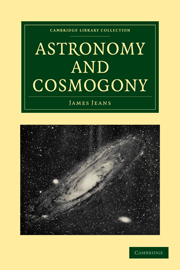Book contents
- Frontmatter
- Contents
- LIST OF ILLUSTRATIONS
- PREFACE
- CHAP. I The Astronomical Survey of the Universe
- CHAP. II The Light from the Stars
- CHAP. III Gaseous Stars
- CHAP. IV The Source of Stellar Energy
- CHAP. V Liquid Stars
- CHAP. VI The Evolution of the Stars
- CHAP. VII Non-spherical Masses–Dynamical Principles
- CHAP. VIII The Configurations of Rotating Liquid Masses
- CHAP. IX The Configurations of Rotating Compressible Masses
- CHAP. X Rotation and Fission of Stars
- CHAP. XI The Evolution of Binary Systems
- CHAP. XII The Ages of the Stars
- CHAP. XIII The Great Nebulae
- CHAP. XIV The Galactic System of Stars
- CHAP. XV Variable Stars
- CHAP. XVI The Solar System
- CHAP. XVII Conclusion
- Index of Subjects
- Index of Names
CHAP. XVI - The Solar System
Published online by Cambridge University Press: 07 September 2010
- Frontmatter
- Contents
- LIST OF ILLUSTRATIONS
- PREFACE
- CHAP. I The Astronomical Survey of the Universe
- CHAP. II The Light from the Stars
- CHAP. III Gaseous Stars
- CHAP. IV The Source of Stellar Energy
- CHAP. V Liquid Stars
- CHAP. VI The Evolution of the Stars
- CHAP. VII Non-spherical Masses–Dynamical Principles
- CHAP. VIII The Configurations of Rotating Liquid Masses
- CHAP. IX The Configurations of Rotating Compressible Masses
- CHAP. X Rotation and Fission of Stars
- CHAP. XI The Evolution of Binary Systems
- CHAP. XII The Ages of the Stars
- CHAP. XIII The Great Nebulae
- CHAP. XIV The Galactic System of Stars
- CHAP. XV Variable Stars
- CHAP. XVI The Solar System
- CHAP. XVII Conclusion
- Index of Subjects
- Index of Names
Summary
368. The original aim of cosmogony was to discover the origin of the solar system, but the whole history of cosmogony illustrates how nothing fails so surely in science as the direct frontal attack. The plan of action in the present book has been to study the various transformations which astronomical matter must undergo through the action of physical forces, identifying the formations predicted by theory with those observed in the sky when possible. In this way it has proved possible to trace out the origin and evolution of many astronomical objects, including elliptical and spiral nebulae, star clusters of various forms, binary and multiple stars and (conjecturally at least) Cepheid and long-period variables. But nowhere have we come upon anything bearing the least resemblance to the solar system.
If the sun had been unattended by planets, its origin and evolution would have presented no difficulty. It would have been a quite ordinary star, born out of a nebula in the ordinary way, but endowed with insufficient rotation to carry it on to the later stages of fission into a binary or multiple system; it could in fact be supposed to have had precisely the same evolutionary career as half of the stars in the sky. In support of the conjecture that the sun had stopped short of fission on its evolutionary career we should only have had to note the slowness of its present rotation.
- Type
- Chapter
- Information
- Astronomy and Cosmogony , pp. 395 - 410Publisher: Cambridge University PressPrint publication year: 2009First published in: 1928



